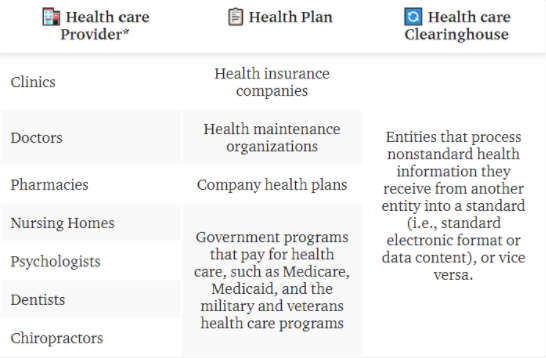As the world is going digitized, the risk of cyber security attacks is increasing. To prevent data security breaches, governments worldwide have enacted some acts/laws that every company must comply with if they’re developing a website/ application that collects or uses the personal data of individuals. Some of the acts that you must abide by our – HIPAA and PIPEDA.
If you’re not aware of what these laws are and why complying with them is necessary, then let’s discuss them in detail!
HIPAA
HIPAA (Health Insurance Portability and Accountability Act of 1996) is a federal US law defined to protect US citizens’ personal health data. The various entities and business associates that must comply with HIPAA include:

If you’re not sure whether you’re a covered entity, you can use the tool by the Centers for Medicare & Medicaid Services.
The Need For HIPAA Compliance
As healthcare providers have gone digital for various operations, such as electronic health records, computerized physician order entry (PCOE), and more, HIPAA compliance is necessary now more than ever. We know all of these electronic means have improved the efficiency and mobility of healthcare providers but have also increased cyber security risk. So, the HIPAA compliance security rule helps protect the privacy of individuals’ health information, also allowing entities to integrate new technologies to improve the efficiency and quality of patient care.
Checklist For HIPAA Compliance
If your organization is subject to the HIPAA, it is recommended to review the HIPAA compliance checklist to make sure that your application abides by the act.
1. Find out all the required annual audits and assessments that are applicable to your organization.
2. Conduct the required audits and assessments, analyze their results, and make a list of all the deficiencies.
3. Document your remediation plans, take actions on your plan and review them annually, and update as necessary.
4. If the organization has not already done so, appoint a HIPAA Compliance, Privacy, and/or Security Officer.
5. Ensure the designated HIPAA Compliance Officer conducts annual HIPAA training for all members of staff.
6. Ensure HIPAA training and staff member attestation of HIPAA policies and procedures is documented.
7. Perform due diligence on Business Associates to assess HIPAA compliance and annually review BAAs.
8. Review processes for staff members to report breaches and how breaches are notified to HHS OCR.
PIPEDA
PIPEDA (Personal Information Protection and Electronic Documents Act) is the federal privacy law for private-sector organizations in Canada.
This act governs how private organizations can collect, use, and disclose individuals’ personal information incorporate business. PIPEDA includes everything from – age, name, ethnicity, IP address, and email ID to medical or credit records. So, no matter what type of application you’re developing, it will always collect the user’s personal information. Therefore, to prevent a data security breach, your app must be a PIPEDA complaint. Whether you’re a Canadian company or not, it’s strictly recommended that all foreign companies comply with PIPEDA if you gather or collect your users’ personal data.
Checklist For PIPEDA Compliance
Before reading the checklist, you must understand there is no one-size-fits-all PIPEDA data privacy act compliance checklist that works for every business.
1. Do you have a designated privacy officer?
2. Conduct an audit to determine the answers to the following questions:
- What type of personal information and why it is collected?
- How is the information collected?
- Where is it gathered/stored/kept?
- What’s the purpose of collecting the information?
- How the information will be secured?
- Who is it shared with?
- When is it disposed off?
- Who has access to it?
3. Conduct a privacy impact assessment and threat analysis.
4. Develop a privacy management program.
5. Develop, document, and implement policies to protect personal information from unauthorized use, disclosure, or modification.
6. Have you developed, documented, and implemented policies to define the purposes of data collection?
7. Are there any policies to obtain valid and meaningful consent from the individuals?
8. Develop, document, and implement policies to limit the collection, use, and disclosure of personal information.
9. Develop, document, and implement policies to ensure information is correct, complete, and current.
10. Ensure security measures are adequate to protect information.
11. Define a retention and destruction timetable.
12. Develop, document, and implement policies to respond to complaints, inquiries, and requests to access personal information.
13. Develop, document, and implement policies to report breaches of personal information and notify those affected.
14. Define best practices to be implemented by third-party service providers with whom personal information is shared.
15. Deliver appropriate privacy training for employees.
What Happens If You Don’t Follow HIPAA And PIPEDA Compliance?
The failure to comply with HIPAA and PIPEDA regulations can result in substantial fines being issued. If there is any data breach, it can result in criminal charges and civil action lawsuits being filed.
So if you’re planning to build a healthcare application, make sure that you cross-check each and every rule of the HIPAA and PIPEDA regulations checklist. You can also hire data security experts to ensure that your app is HIPAA and PIPEDA compliant.
But if you’re looking for a reliable web and mobile app development partner to support you with your new product – we’re here to help you! Get in touch with us today!
